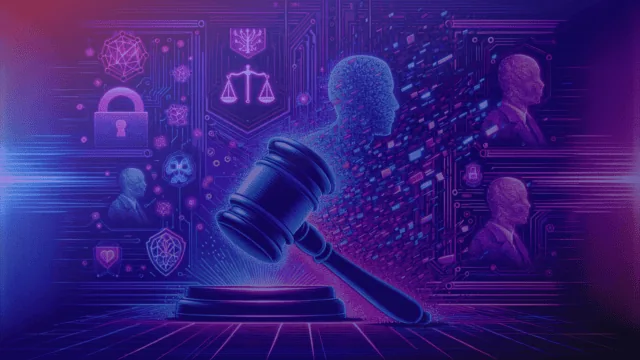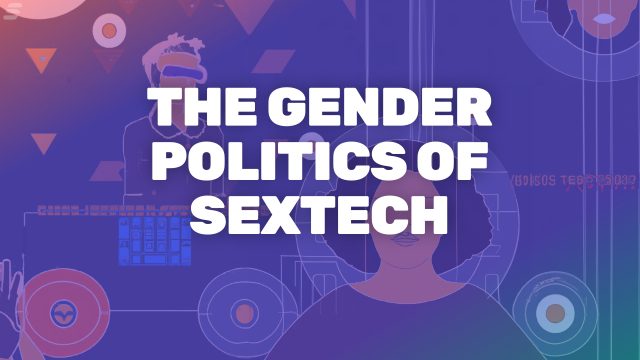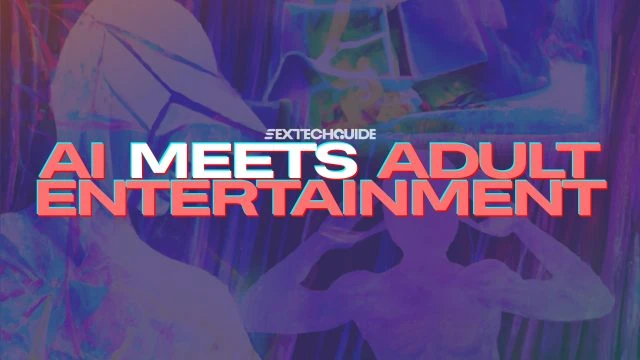Should an artificially intelligent sex robot have the right to refuse consent? Our ancestors never had to worry about such things as the ethical dilemmas of sextech.
We’ve made sex uniquely difficult for ourselves as a species, and we’re laser-focused on making it more and more difficult for ourselves every day. There’s a weird kind of privilege in that. With the gifted ability to think deeply, comes the burden of being able to deeply overthink.
AI is no longer the next big thing. It’s the current thing, and things are moving faster than we can think. The rate of the AI evolution has a telescoping nature, with each generation becoming more complex by orders of magnitude, and each evolution manifesting within acceleratingly short periods.
Barring a giant solar flare or a nearby star going supernova, AI is here for the long term. As people who depend on sex for our own long term, an honest appraisal of the ethical dilemmas of AI in sextech is mandatory.
So, what are those dilemmas?
Data, anonymity, and security

AI depends on huge volumes of real-world and digital data to extrapolate its decisions. That data has to come from somewhere, and to most accurately reflect human intelligence, it comes from you.
If we were developing artificially intelligent egg poachers or something, perhaps that might not be an issue. There isn’t anything ethically problematic about that. But when we’re dealing with issues as intrinsically and inherently personal as sex, ethical issues carry more weight.
Let’s speculate.
Let’s say some forward-thinking sextech brand collects data about your orgasm cycle using various sensory algorithms, in order to process the information in a central server bank somewhere in the Kazakh steppe in order to make the sex toy more effective, and its sensations more personalized to you.
What then happens if those servers are compromised, and that data is harvested by people with the intention of blackmailing you about your use of a sex toy? What if an employer is informed you were using the toy during work hours?
Worse, the knowledge that you own a sex toy at all might be enough to extort you if you are a public figure.
Let’s go bigger. Let’s say you live in a place with a two-party system. Right now, your government has relatively liberal attitudes towards sex and sexuality. Perhaps you’re queer, and you’re interacting with an artificially intelligent chatbot as a valve for your sexual desire. But then the government changes, and swings drastically towards a more conservative one. Now, your data, in fact your whole identity, is illegal and the new government is demanding access to the data on those servers. Your interactions have become dangerous overnight.
And now let’s go smaller. How invasive would it feel to be served ads for STI treatments because an AI algorithm has deemed you to be sexually promiscuous based on your app usage?
Just as a weapon poses no inherent danger without human intervention, your data is safe as long as no one has it in mind to use it against you. And the sextech industry has a poor record for anonymising its data. Certainly the demand for a personalised digital experience makes such a balance difficult, but insecure data handling by sextech businesses poses significant ethical, emotional, and social harm.
Consent & autonomy

The data being used to train large AI models has been largely aggregated without fully informed consent. Sure, we all clicked ‘agree to the terms and conditions’ at some point, but should we be held hostage to that decision forever?
It’s not ethical to assume that ordinary people actually know what data is used by AI and how. It’s easy to agree to the use of our information, but real expertise is required to understand what that use means. Because of the suspiciously opaque nature of the transmission of high volumes of data, it is easy to believe that a family member’s likeness could be pulled from their social media to train AI models that are then used in the production of artificially generated porn.
That is happening right now, and it’s not simply a problem restricted to celebrities.
The ethical implication here is that it takes not much more than a few clicks to insert a real person, believably, into a fictional sexual scenario without their consent or knowledge.
Deepfaking, as the process is known, is probably the oldest ethical dilemma faced by the encroachment of AI onto sex, and the most obvious. But potentially not the most harmful.
The goal of artificial intelligence is to simulate realistically human patterns of thought. The better trained an AI model is, the more accurately it can fulfil its obligations. In the arena of sextech, that can potentially lead to impersonation, and manipulation.
For example, it’s already common for consumers to believe that they’re speaking to cam girls when they are in fact speaking to a well-trained AI chatbot. In the short term, we can assume that money might be exchanged based on ethically dubious – if not outright fraudulent – terms. But there’s a greater risk for the longer term, as younger generations have their own behavior trained in turn to consider sexual interactions in purely artificial, transactional terms.
And in even longer terms, if this well-trained AI in turn begins to train people right back, as we can reasonably assume it will, free will and personal autonomy might be dissolved. Decisions made by goal-oriented AI without sufficient ethical checks and balances run the risk of subtly altering behavior over years in completely unforeseen ways.
In other words, if AI algorithms are trained over years to reward, say, sexual behavior on social media (which it does), it will ultimately raise a generation to behave in overtly sexual ways, potentially leading to unhealthy sexual practices, and sexualisation at increasingly younger ages.
We spoke to Dr. Kate Devlin, a Reader in Artificial Intelligence & Society at King’s College London and author of the acclaimed Turned On: Science, Sex & Robots. She said:
“A lot of the work to date on sex robots is about their physicality rather than their conversational abilities. So with a robot, there are worries about objectification around appearance, or physical ‘harm’ and how that might play out in the real world. [But] with conversational AI, the emphasis shifts to content: how is that being generated? Is it moderated? Is it okay for our fantasies to be expressed verbally in a two-way interaction that has the potential to be seen by others? And who decides what the threshold for moderation is?”
That hypothetical decision-making moderator would be in a position of incredible social power, with the potential to do lasting harm to our collective psychosexual development for generations. In matters of such huge numbers, as in those related to big data, any tiny decision is greatly amplified, and seemingly minor moderation decisions are destined to have massive unforeseen implications. You can check out Dr. Devlin’s Tedx talk for more on this topic.
AI rights & agency

Related to issues of consent and human autonomy are the issues of AI autonomy and agency. Here we risk straying in speculative sci-fi, but these issues are coming down the pipe very fast, and require mature thought now, before they arrive.
Let’s look again at the question that opened this piece: should an artificially intelligent sex robot have the right to refuse consent?
Right now, it’s just a thought experiment. But soon, we will have to wrestle with this in practice, because at what point is artificial intelligence actually intelligent? Without getting over our heads in the metaphysics of it, do we have to wait for the next generation of emotionally intelligent sextech before we concern ourselves with the ethical implications of such a question?
In clearer language, should AI systems developed for intimate interactions be afforded certain rights, or be held to the same ethical standards as we are?
That might sound silly at first glance – after all, even in sextech, AI is simply a tool. But it matters because, and this is important, who is accountable if AI sextech does some kind of harm? What if AI can be hijacked to service an illegal paraphilia? Is there a criminal act involved there?
It’s not beyond reason to suspect the developers of the AI system might want to defer blame to the AI system itself for any negative outcomes. But that would require the AI system to have the capability to accept accountability, and that would require certain rights to be afforded to it, and an ethical framework in which it can operate. No such ethical framework has yet been established for accountability.
Questions like these are yet to be openly discussed, much less litigated. But they’re coming.
Social implications

Much of our lives have transitioned online over the last two decades. It should be no surprise that large sections of our intimate lives have followed suit. But at what point does that represent an ethical social problem?
In the worst case, we might imagine a world in which artificial intelligence is sufficiently complex as to be a convincing substitute for real-world sexual interactions, which in turn might lead to social isolation, to the detriment of human intimacy, and emotional availability.
Equally, the use of artificially generated sexual partners might lead to the normalization of harmful, or at least unhealthy, expectations about human partners. If we take the assumption that in-person relationships are healthy, AI’s ability to take our desires and create personalized and augmented manifestations of them might lead to a sense of disappointment that such a system can’t possibly be “real” – that a “real” partner can never match up to the artificial perfection of an AI model. A meal never tastes as good again after you’ve had the same meal with added MSG.
The integration of AI in sextech has the power to quickly undermine and shift societal norms around sex and relationships. Unless you’re of the Grimes-ian school of philosophy, and you “want to be software”, uploaded to the Cloud, it’s likely that society will quickly need to develop a new set of ethical standards by which we measure and moderate our behavior.
For example, since the data being used to train large AI models inevitably encodes our culture’s existing biases and stereotypes, AI in sextech knows no better than to innocently perpetuate those existing gender and power imbalances, indirectly reinforcing and entrenching them. Sextech, in its enthusiasm to capitalize on unbridled AI, might exploit vulnerable communities rather than protect them – particularly if that AI can be used for harmful or illegal sexual preferences.
To put that point bluntly, and by way of example: much AI-generated porn is produced by, and targeted towards, men, and it often caters to non-traditional sexual tastes. There is a LOT of transgender AI porn out there. To create it, AI takes data about the trans community, and sexualizes it to cater to the tastes of the consumer. However, the images it produces are hyper-stylised, unrealistic depictions of a community that already indexes high for issues related to body dysmorphia. The unethical implications of that should need no further commentary.
The level of expertise required to ensure the security of marginalized communities simply does not exist in the sextech industry. To offer my own personal opinion for a moment, but with more than 20 years working across most of the major sextech brands, I can assure you that the CEOs of your favorite sex toy companies or porn studios are not the people we should trust to be safeguarding sexual ethics in artificial intelligence. There are no safety railings in sextech. None.
From spurious medical claims to blockchain

Which brings us to the final ethical dilemma in AI sextech: the vast, cavernous space there is for-at best- misrepresentation, and at worst outright charlatanry, and the inherent damage it can do.
You might recall Calmara, an app that claimed to use AI neural networks to identify STI symptoms from an uploaded photograph of your genitals. Setting aside the gobsmacking stupidity of such an idea, the real insight is that the idea was a seductive one. The app didn’t do anything other than harvest dick pics, but the integration of AI into sex was enough to garner the business a landslide of publicity and, therefore, money.
However, what it did potentially provide was a false sense of safety, because the majority of STI symptoms are not visible. Of course they’re not.
With a spot on a late night TV show, the PR quickly and thankfully took a more responsible position and scorn ensued. But Calmara is a useful example: it’s very easy to baffle a layperson with vaguely scientific language until they believe your glossy new AI sextech has some kind of arcane value.
We’ve seen it before, recently, in spaces like NFTs and tokenomics. Those seem benign by comparison. Calmara had the potential to be actively dangerous. While it was seeking as much investment as quickly as possible.
Calmara’s foray into the limelight ended as swiftly as it started, with the founders agreeing to close the app down as the result of a Federal Trade Commission investigation into the medical claims made. The FTC noted that:
“As HeHealth’s principal study conceded, (1) the data HeHealth used to test and train the AI detection model included images uploaded by individuals who were never subjected to diagnostic tests (e.g., “microbiologic or histologic testing”) to confirm whether the individual associated with the image did in fact have an STI or not, (2) “the performance of the model was assessed on a relatively small number of
images, limiting the precision of [the] findings,” and (3) four of the five authors of the study either
worked for HeHealth or were paid consultants. In addition, staff had concerns that an individual
with an asymptomatic STI would be far less likely to have accurate results because the AI was
trained to detect visual symptoms like marks or lesions. Finally, according to the principal study,
the AI was trained and assessed to detect 4 STIs, but Calmara claims to detect 10 or more
conditions.”
HeHealth, the parent company of the product, was also instructed to refund customers.
Conclusion
AI is an ethical concern in a lot of regards, and everything that’s a concern for AI in general counts double in sextech.
Sextech is an industry that operates with light restraint, even at the best of times, but with ready access to big data and AI algorithms, as well as image generation and the potential for abuse, ethical guide ropes are needed, and they were needed yesterday.









Leave a Reply